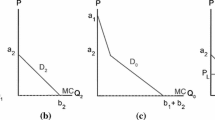Abstract
For a company planning to become a mobile operator, two alternative ways to enter the market exist. In addition to the traditional way of acquiring a spectrum license and building a mobile network, market entrance is also possible by becoming a virtual operator and utilizing the existing networks of incumbent operators. Potentially, virtual operators will have an important role in shaping the mobile market structure and competition. In this paper, techno-economic modeling methods are used to analyze the position of virtual operators in the mobile communications industry. Four alternative virtual operator scenarios are constructed and analyzed using a linear, deterministic, and quantitative techno-economic model. The results highlight the importance of wholesale contracts with incumbent mobile network operators in determining the virtual operators’ business profitability. Unbalance in termination prices between fixed and mobile networks is shown to give incentives for virtual operators to invest in their own network infrastructure.
Similar content being viewed by others
References
Commission of the European Communities (2003). Commission recommendation 2003/311/EC on relevant product and service markets within the electronic communications. 11 February 2003.
Commission of the European Communities (2006). Commission staff working document, Volume I. Annex to the European electronic communications regulation and markets 2005 (11th Report). SEC(2006)193. Brussels, 20.2.2006.
ECOSYS (2005). Techno-ECOnomics of integrated communication SYStems and services. Project website. Available at: http://www.celtic-ecosys.org.
European Union (2002). Directive 2002/19/EC of the European Parliament and of the Council, of 7 March 2002, on access to, and interconnection of, electronic communications networks and associated facilities (Access Directive).
European Union (2002). Directive 2002/21/EC of the European Parliament and of the Council, of 7 March 2002, on a common regulatory framework for electronic communications networks and services (Framework Directive).
Ims, L. A. (ed.) (1998). Broadband access networks—introduction strategies and techno-economic evaluation. London: Chapman & Hall.
Kanervisto, J. (2005). MVNO Pricing structures in Finland. Publication 21/2005. Helsinki: Ministry of Transport and Communications.
Katsianis, D., Welling, I., Ylonen, M., Varoutas, D., Sphicopoulos, T., Elnegaard, N. K., et al. (2001). The financial perspective of the mobile networks in Europe. IEEE Personal Communications, 8(6), 58–64.
Kiiski, A., & Hämmäinen, H. (2004). Mobile virtual network operator strategies: Case Finland. ITS 15th Biennial conference. Berlin, Germany (4–7 September 2004).
Kiiski, A. (2006). Impacts of MVNOs on mobile data service market. 17th European regional ITS conference. Amsterdam, Netherlands (22–24 August 2006).
Ministry of Transport and Communications, Finland (2003). Communications market act. Unofficial translation, May 2003.
Monath, T., Elnegaard, N. K., Cadro, P., Katsianis, D., & Varoutas, D. (2003). Economics of fixed broadband access network strategies. IEEE Communications Magazine, 41(9), 132–139.
Olla, P., & Patel, N. V. (2002). A value chain model for mobile data service providers. Telecommunications Policy, 26(9–10), 551–571.
TONIC (2002). TechnO-ecoNomICs of IP optimised networks and services. Project web-site. Available at: http://www-nrc.nokia.com/tonic/.
Ulset, S. (2002). Mobile virtual network operators: A strategic transaction cost analysis of preliminary experiences. Telecommunications Policy, 26(9–10), 537–549.
Varoutas, D., Katsianis, D., Sphicopoulos, T., Stordahl, K., & Welling, I. (2006). On the economics of 3G mobile virtual network operators. Wireless Personal Communications, 36(2), 129–142.
Author information
Authors and Affiliations
Corresponding author
Rights and permissions
About this article
Cite this article
Smura, T., Kiiski, A. & Hämmäinen, H. Virtual operators in the mobile industry: a techno-economic analysis. Netnomics 8, 25–48 (2007). https://doi.org/10.1007/s11066-008-9012-3
Received:
Accepted:
Published:
Issue Date:
DOI: https://doi.org/10.1007/s11066-008-9012-3




